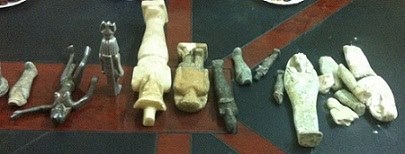Sudan wants to stiffen penalties for stealing antiques
August 22, 2015 (KHARTOUM) – The economic security division at the National Intelligence and Security Services (NISS) in Sudan said that proceeds from the sale of ancient artifacts is comparable to those generated by drug trade.
 Last May, the parliament summoned the Director General of the General Authority for Antiquities and Museums Ali Abdul-Rahman after a growing trend of robberies targeting museums and monuments.
Last May, the parliament summoned the Director General of the General Authority for Antiquities and Museums Ali Abdul-Rahman after a growing trend of robberies targeting museums and monuments.
Four cases of stolen antiques were reported in 2014 including five artifacts from al-Borkol Museum, two pieces from the Royal Merowite in Bajraoah that were part of water transportation system to the Royal bath and parts of a 40-years old sandal tree that was planted at the inauguration of the Sudan National Museum.
The minister of state at the Ministry of Tourism, Antiquities and Wildlife Adel Hamid Deglu angrily vowed to “chop the hands of anyone who dares to steal, smuggle or sabotage the Sudanese effects”.
The minister underscored during a meeting on Monday with the chief prosecutor of the State Security after seizing stolen artifacts, the importance of toughening punishments in the law for stealing and smuggling antiquities.
He pointed out that the weakness of these laws is encouraging the commission of these crimes that affect the sovereignty of the country and its history.
For his part, the Undersecretary of the Ministry of Tourism and Antiquities Abdul Qadir Graham said that antiques are a sovereign piece work that maintains the cognitive and tourist treasures of the country and pointed out that their recovery is to retrieve priceless scientific and material value.
The head of the State Security Prosecution said that all actions and communications related to antiques are done in coordination with tourism and antiquities police.
He added that prosecutors formed an ad-hoc committee to deal with the seized artifacts to determine their authenticity and which is counterfeit effects, pointing to the important role played by the National Authority for Antiquities in the receipt of these effects and preserving them as a national treasure.
The representative of the NISS economic security division Abdul-Ilah al-Qaddal stressed the need for coordination and cooperation between the state security and those working in the field of archeology and training personnel working in areas related to antiques.
He said that trading in stolen antiques has become lucrative business and as such penalties must be strengthened so as not to encourage criminals to persist in this illegal activity.
(ST)
